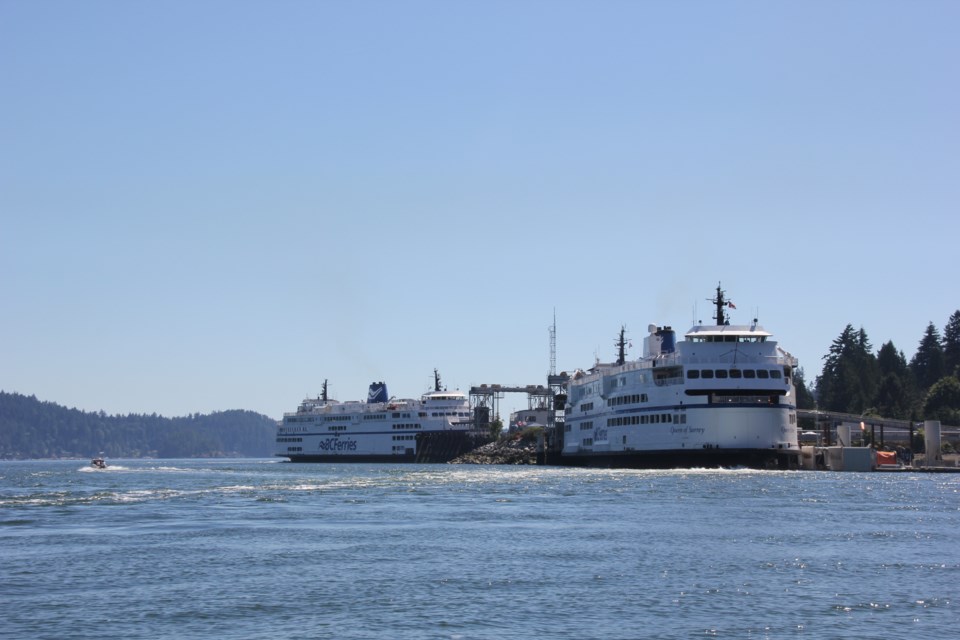The chairperson of the Southern Sunshine Coast Ferry Advisory Committee (FAC), Diana Mumford shared a Vancouver stage with Premier David Eby on Feb. 26. Mumford, who also leads BC Ferries’ FAC chairperson’s group was on hand for the announcement of $500 million in new provincial funding for the ferry corporation. That money is earmarked to keep fare increases to three percent or less over the coming four years and to help electrify and ”green” BC Ferries’ (BCF) fleet.
Eby, who made the announcement after marking his first 100 days in office, said the cash would come from the most recent budget surpluses.
Eby said the impacts of global inflation will be taking a toll on ferry users over the next four years, citing the B.C. Ferries commissioner’s report of fare increases of 10.4 per cent a year from 2024 to 2028. That was due to increases in core costs like fuel, along with higher inflation driving up costs. Final fare increases will be determined by the B.C. Ferries Commission, which will determine by March 31 the preliminary annual fare increases for the next four years. The final annual fare increases will be published by Sept. 30.
“We know the cost of everything continues to go up due to global inflation, but by acting now, we can prevent double-digit fare increases from hitting people who depend on our ferries,” Eby stated.
Mumford’s perspective
As she waited at Horseshoe Bay ferry terminal to return to her Sechelt home after the announcement, Mumford did quick calculations on what compounded 10 per cent fare increases could have meant. She told Coast Reporter her $65 ticket for a standard vehicle and driver could have escalated to around the $92 mark by 2028, “and now, hopefully, we are not going there.”
Holding fare increases to the three per cent range will impact more than travel costs for local residents, she said in a Feb. 27 interview. “Ferry fares also impact the price of what we buy in the grocery store and what we can get anywhere locally, so it will help people on the Sunshine Coast very significantly,” she commented.
“Does it solve all of BC Ferries problems? Absolutely not, but it is a positive.”
As for resolving capacity and reliability issues with the ferry service, Mumford said she views the March 6 arrival of Nicolas Jimenez as BCF’s chief executive officer (CEO) as an opportunity for change and improvement. She said making change with an interim CEO at the helm was “challenging” for the organization. (Jill Sharland has served in that role since July, 2023 following the dismissal of previous CEO Mark Collins. With Jimenez’s arrival, Sharland returns to her role as BCF’s vice president and chief financial officer.)
Mumford said the announcement was also significant for her as a Coast resident. “So often we hear of the funds that are being spent on roads and bridges and all that infrastructure but to see this acknowledgment of ferries and their importance to the economy and residents of BC was a big factor for me,” she stated.
Being there to hear that in person was a bonus for Mumford. She said it more that made up for the jumble of arrangements she had to make as the location of the press conference changed from Swartz Bay to downtown Vancouver, and as heavy snowfall affected travel on the Coast and the Lower Mainland the day before the announcement.
'Greening' BCF’s fleet
The new money is also to support greenhouse gas emissions reduction through the electrification of vessels and other initiatives to green the fleet and operations. At the press conference, Minister of Transportation and Infrastructure Rob Fleming made reference to the six battery hybrid electric Island Class ferries added to the fleet in 2022. He noted that improved shore power capacities at terminals need to be implemented to support and expand on those types of services.
A proponent of a proposed passenger-only electric ferry service between Gibsons and Vancouver indicated the province is “missing the boat” when it comes to investing in a ferry system that meets the changing needs of users.
In Greenline Ferries spokeperson Callum Campbell’s view, ferry users want the ferries to be reliable and affordable, while government wants them to be green and economical for taxpayers.
“Achieving all of these things became impossible for a car ferry system that was established in the 1960s based on the assumption that cars would remain the primary mode of transportation and fuel prices would remain stable. These assumptions are out of touch with what is happening today.
“Additional funding for BC Ferries does not solve this major problem with the current coastal ferry model. The funding announcement signals that we are locked into growing a car ferry system that will not address the climate crisis and that is increasingly disconnected from how people live and move around in BC. The government has missed an opportunity for modal shift that could include a system of low-or no-emissions passenger-only ferries to complement the car ferry system,” Campbell wrote in a Feb. 26 email to Coast Reporter.
Mumford said she viewed a blend of vehicle and passenger-only services as possibly helpful, ”but we have to be practical."
“I see a lot of times when local sailings are full of vehicles and not many when they are full of passengers.” That makes her unsure of the level of impact a passenger-only service would have.
With files from Darron Kloster Times Colonist


